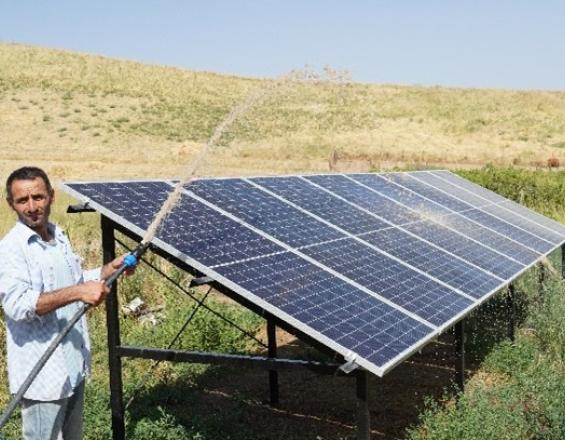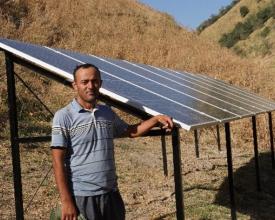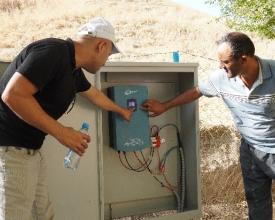
Expansion of Renewable Energy Solutions in Agriculture

The proposed green energy solutions are focused on agriculture in Tajikistan, addressing critical irrigation and energy access issues. Established in 2016, the company 'Tekhnologiyahoi Sabz' (Green Technologies) installs solar-powered pumps and irrigation systems to overcome water shortages, frequent power outages, and high diesel costs. Their solar and micro-hydro systems provide efficient, sustainable water access for rural farms, significantly improving agricultural productivity while lowering operational expenses and carbon emissions. By fostering sustainable farming practices, these solutions enhance economic viability for farmers and contribute to a resilient, eco-friendly agricultural sector, advancing Tajikistan’s green transition. The company also offers solar cooling systems for storage and backup power solutions, further reducing dependency on conventional energy and promoting long-term financial and environmental benefits for Tajikistan's agricultural future.
Context
Challenges addressed
i. Climate Change:Climate change worsens agricultural challenges: frequent droughts and erratic rainfall increase water scarcity, while rising temperatures and evaporation reduce soil moisture and crop yields. Extreme weather like floods degrades soil, and shorter growing seasons threaten food security. Solar pumps transform unused lands into productive areas, prevent erosion, and boost local yields while reducing emissions and improving environmental conditions.
ii. Ecological Challenge: Solar-powered irrigation systems provide a sustainable solution to conserve water and improve productivity in water-scarce regions.
iii. Economic Challenge: Renewable energy solutions reduce energy costs by up to 70% and irrigation losses by up to 40%, boosting agricultural efficiency and profitability.
iv. Social Challenge: Sustainable energy solutions enhance rural development, improving living standards, productivity, and access to essential services, supporting rural economic growth.
Location
Process
Summary of the process
Tekhnologiyahoi Sabz plays a crucial role in Tajikistan’s renewable energy sector, focusing on sustainable solutions for the agricultural industry. Rural areas face frequent power interruptions and high energy costs, which hamper agricultural productivity, a core part of the country's economy. Tekhnologiyahoi Sabz supports Tajikistan’s goals for energy independence and sustainability by offering tailored solar and micro-hydropower systems that reduce farmers’ energy costs by up to 70% and cut irrigation and storage losses by 40%.
To achieve this, the company provides high-efficiency solar-powered irrigation systems and storage solutions that help farmers transition from costly diesel and unreliable grid power to renewable energy sources, boosting productivity and reducing environmental impact. To ensure long-term sustainability, Tekhnologiyahoi Sabz is also establishing a repair and testing facility for green energy equipment, offering maintenance and training for local technicians. This end-to-end support model allows agricultural businesses to overcome logistical and economic barriers, ensuring reliable energy access, lower operational costs, and sustainable growth in Tajikistan’s rural sector.
Building Blocks
Financial Viability
The financial viability of solar solutions with reduced operational costs made them highly attractive to farmers. The installation of solar panels and pumps in Tajikistan currently has a payback period of approximately 8 to 10 years, given the existing energy tariffs. However, through the project, which covers about half of the farmers' expenses, this payback period could be reduced by half for those with access to the power grid. On the other hand, farmers without grid access often do not engage in gardening or agriculture. Some farmers are using diesel generators, which significantly increases their costs and contributes to atmospheric pollution. In such cases, the installation of solar solutions could serve as an effective alternative.
Provision of technical training session to farmers for the maintainance of the solar infrastructure
To enable farming businesses to significantly reduce energy costs and minimize irrigation and storage losses, this initiative focuseson deploying solar-powered irrigation systems and storage solutions tailored to the needs of rural farmers. Through these renewable energy systems, farmers can achieve up to 70% reduction in energy expenses by shifting from diesel and the public grid to solar power. This transition also decreases irrigation and storage losses by up to 40%, improving water and resource management. Technical training sessions will be provided to farmers, equipping them with the knowledge to maintain and optimize these systems, ensuring reliable and sustained energy savings and operational efficiency for a more resilient agricultural sector.
Establishing Repair and Testing Facility for Long-Term Sustainability
To support the long-term sustainability of green energy solutions, a dedicated repair and testing facility was established to serve as a local resource for maintaining and enhancing green energy equipment. The repair and testing facility provide repair services, regular testing, and technical assessments for solar pumps, storage units, and other renewable systems, ensuring optimal functionality and durability. In addition, the center offers training programs for local technicians, creating a skilled workforce capable of supporting green energy equipment across rural areas. This initiative not only guarantees that farming businesses have reliable access to well-maintained energy systems but also promotes local job creation, fosters self-reliance, and strengthens the resilience of the agricultural sector’s green transition.
Impacts
- Climate change adaptation and mitigation outcome: Reduced dependence on fossil fuels by increasing the use of solar energy for irrigation, cooling, and power backup.
- Environmental outcomes: Improved water use efficiency and reduced carbon emissions through the replacement of electricity and diesel generators.
- Economic outcomes: Lowered energy costs by 70% for participating farmers and reduced storage losses by 40%.
- Social outcomes: Increased productivity and profitability for rural farming businesses, contributing to rural development.
Beneficiaries
The beneficiaries of Tekhnologiyahoi Sabz’s solutions are rural farming communities, agricultural businesses, and local technicians in Tajikistan.




